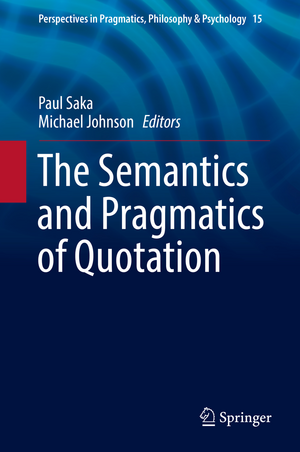The Semantics and Pragmatics of Quotation: Perspectives in Pragmatics, Philosophy & Psychology, cartea 15
Editat de Paul Saka, Michael Johnsonen Limba Engleză Hardback – 27 dec 2017
The chapters in this volume address a variety of issues surrounding quotation, such as whether it is a pragmatic or semantic phenomenon, what varieties of quotation exist, and what speech acts are involved in quoting. Quotation poses problems for many prevailing theories of language. One fundamental principle is that for a language to be learnable, speakers must be able to derive the truth-conditions of sentences from the meanings of their parts. Another popular view is that indexical expressions like "I" display a certain fixity -- that they always refer to the speaker using them. Both of these tenets appear to be violated by quotation.
This volume is suitable for scholars in philosophy of language, semantics, and pragmatics, and for graduate students in philosophy and linguistics. The book will also be useful for researchers in other fields that study quotation, including psychology and computer science.
| Toate formatele și edițiile | Preț | Express |
|---|---|---|
| Paperback (1) | 949.10 lei 43-57 zile | |
| Springer International Publishing – 23 mai 2018 | 949.10 lei 43-57 zile | |
| Hardback (1) | 955.08 lei 43-57 zile | |
| Springer International Publishing – 27 dec 2017 | 955.08 lei 43-57 zile |
Din seria Perspectives in Pragmatics, Philosophy & Psychology
- 24%
 Preț: 628.50 lei
Preț: 628.50 lei - 24%
 Preț: 825.95 lei
Preț: 825.95 lei - 18%
 Preț: 959.98 lei
Preț: 959.98 lei - 18%
 Preț: 1023.28 lei
Preț: 1023.28 lei - 20%
 Preț: 572.65 lei
Preț: 572.65 lei - 15%
 Preț: 656.43 lei
Preț: 656.43 lei - 18%
 Preț: 729.23 lei
Preț: 729.23 lei - 15%
 Preț: 647.59 lei
Preț: 647.59 lei - 15%
 Preț: 586.05 lei
Preț: 586.05 lei - 15%
 Preț: 704.04 lei
Preț: 704.04 lei - 18%
 Preț: 904.11 lei
Preț: 904.11 lei - 18%
 Preț: 963.60 lei
Preț: 963.60 lei - 15%
 Preț: 662.16 lei
Preț: 662.16 lei - 15%
 Preț: 636.63 lei
Preț: 636.63 lei - 15%
 Preț: 528.80 lei
Preț: 528.80 lei - 15%
 Preț: 643.84 lei
Preț: 643.84 lei - 15%
 Preț: 634.32 lei
Preț: 634.32 lei - 18%
 Preț: 729.53 lei
Preț: 729.53 lei - 15%
 Preț: 653.46 lei
Preț: 653.46 lei - 15%
 Preț: 582.12 lei
Preț: 582.12 lei -
 Preț: 490.46 lei
Preț: 490.46 lei - 5%
 Preț: 721.40 lei
Preț: 721.40 lei - 18%
 Preț: 779.39 lei
Preț: 779.39 lei - 15%
 Preț: 705.65 lei
Preț: 705.65 lei - 18%
 Preț: 726.06 lei
Preț: 726.06 lei - 18%
 Preț: 725.61 lei
Preț: 725.61 lei - 18%
 Preț: 1420.24 lei
Preț: 1420.24 lei
Preț: 955.08 lei
Preț vechi: 1164.73 lei
-18% Nou
Puncte Express: 1433
Preț estimativ în valută:
182.76€ • 191.29$ • 152.11£
182.76€ • 191.29$ • 152.11£
Carte tipărită la comandă
Livrare economică 31 martie-14 aprilie
Preluare comenzi: 021 569.72.76
Specificații
ISBN-13: 9783319687469
ISBN-10: 3319687468
Pagini: 340
Ilustrații: VIII, 382 p. 148 illus.
Dimensiuni: 155 x 235 mm
Greutate: 0.72 kg
Ediția:1st ed. 2017
Editura: Springer International Publishing
Colecția Springer
Seria Perspectives in Pragmatics, Philosophy & Psychology
Locul publicării:Cham, Switzerland
ISBN-10: 3319687468
Pagini: 340
Ilustrații: VIII, 382 p. 148 illus.
Dimensiuni: 155 x 235 mm
Greutate: 0.72 kg
Ediția:1st ed. 2017
Editura: Springer International Publishing
Colecția Springer
Seria Perspectives in Pragmatics, Philosophy & Psychology
Locul publicării:Cham, Switzerland
Cuprins
Part I. Use & Mention.- Scare-Quoting and Incorporation, Mark McCullagh.- Blah, blah, blah: Quasi-Quotation and Unquotation, Paul Saka.- Use-Mention Confusions in “Sloppy, Colloquial Speech”, Marga Reimer.- A Bridge from the Use-Mention Distinction to Natural Language Processing, Shomir Wilson.- Part II. Quotation Unified.- Unity in the Variety of Quotation, Kirk Ludwig & Greg Ray.- Semantics vs. Pragmatics in Impure Quotation, Mario Gómez-Torrente.- Reference and Reference-Fixing in Pure Quotation, Manuel García-Carpintero.- Quotation in Dialogue, Eleni Gregoromichelaki.- Part III. New Directions.- The Pragmatics of Attraction: Explaining Unquotation in Direct and Free Indirect Discourse, Emar Maier.- Quotation through History: A Historical Case for the Proper Treatment of Quotation, Michael Johnson.- Ideo- and Auto-Reflexive Quotation, Wayne A. Davis.- Referential Analysis of Quotation, Dale Jacquette.- Monsters and I: The Case of Mixed Quotation, KasiaM. Jaszczolt and Minyao Huang
Recenzii
“The volume offers a very good depiction of current research in the diverse and active field of quotation. … anyone working on quotation will find it useful and thought-provoking.” (Erik Stei, Language, Vol. 95 (2), June, 2019)
Textul de pe ultima copertă
The chapters in this volume address a variety of issues surrounding quotation, such as whether it is a pragmatic or semantic phenomenon, what varieties of quotation exist, and what speech acts are involved in quoting. Quotation poses problems for many prevailing theories of language. One fundamental principle is that for a language to be learnable, speakers must be able to derive the truth-conditions of sentences from the meanings of their parts. Another popular view is that indexical expressions like "I" display a certain fixity -- that they always refer to the speaker using them. Both of these tenets appear to be violated by quotation.
This volume is suitable for scholars in philosophy of language, semantics, and pragmatics, and for graduate students in philosophy and linguistics. The book will also be useful for researchers in other fields that study quotation, including psychology and computer science.
This volume is suitable for scholars in philosophy of language, semantics, and pragmatics, and for graduate students in philosophy and linguistics. The book will also be useful for researchers in other fields that study quotation, including psychology and computer science.
Caracteristici
Includes contributions from a wide range of leading scholars on quotation in philosophy and linguistics Illustrates cutting edge research on new topics such as quotation across split utterances in dialogue Is the only edited volume on quotation that is not based on a conference
